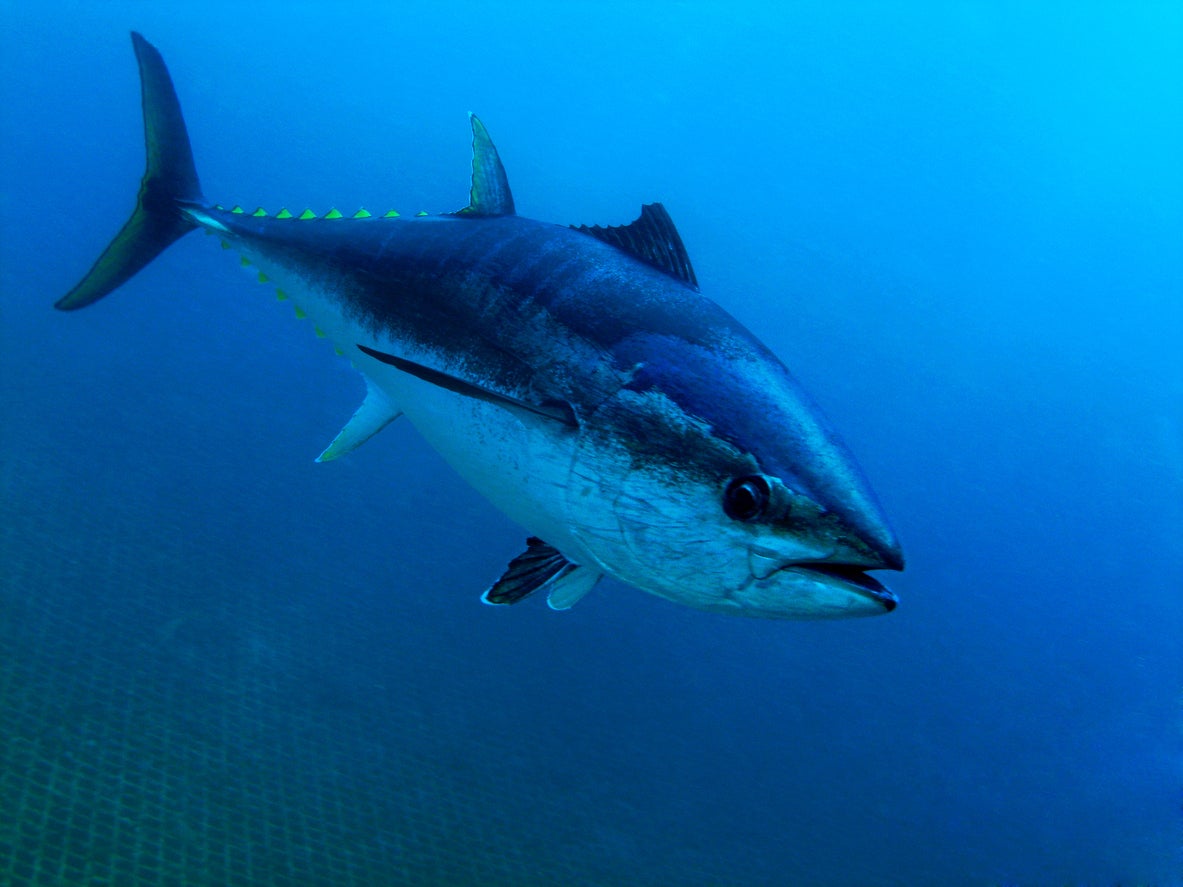International fishing organisation 'incentivising' anglers to catch some of world's most endangered species
Exclusive: Sports fishers encouraged to snare great white sharks and rare southern bluefin tuna by International Game Fish Association for world records

An international fishing organisation is offering anglers the prospect of setting world records for 18 of the most critically endangered species, placing further pressure on waning global populations The Independent can reveal.
Scientists say the Florida-based International Game Fish Association (IGFA), which issues world records, is “incentivising” sport fishers to catch the biggest fish.
Sport fishers aim to catch the largest species in the sea in order to break world records. Often the biggest fish are the most fertile and catching them further exacerbates the issue of dwindling stock.
In total, more than 90 species on the IGFA’s world record database are listed as threatened with extinction by the International Union for the Conservation of Nature (IUCN), including the great white shark, the southern bluefin tuna, and atlantic cod.
According to a study by David Shiffman, a marine biologist at Simon Fraser University, trophy fishing selectively targets the biggest fish in a group, triggering a potentially disproportionate impact on population numbers for species already threatened with extinction.
Mr Shiffman told The Independent overfishing was a “critically important” issue in terms of both biodiversity conservation and global food security, and that “we can no longer ignore how recreational fishing affects threatened fish species”.
The marine biologist said the IGFA could “relieve fishing pressure” on the most fertile members of dozens of species around the world by changing its policy to only accept length-based, catch-and-release records for species threatened with extinction.

Weight records require anglers to put the fish on land-based scales, meaning many die in the process of getting there, whereas length records allow the fish to be quickly released back into the water.
“It’s difficult to imagine a conservation policy that would help more threatened species with so little cost,” he said.
Jack Vitek, outreach manager at IGFA, said “roughly half” of the 500 to 600 fish submitted each year for world records are released alive, of which only “a couple” were applications for endangered species.
He said the organisation had introduced separate length-based records for a selection of fish species five years ago.
But Mr Shiffman’s 2014 study, which was published in the journal Marine Policy, claimed anglers often catch near record-sized fish for evaluation, meaning many more are potentially being killed than are officially submitted to IGFA.
Critically endangered species on IGFA world record list
Giant barb, giant sea bass, giant catfish, European eel, black grouper, Goliath grouper, Warsaw grouper, speckled hind, Japanese huchen, blue mackerel, European monkfish, giant pangasius, Daggerhead seabream, beluga sturgeon, apache trout, southern bluefin tuna
“The number of people turning in paperwork to claim they caught a record fish is not a valid measure of fishing effort, and they know it, just as the number of people who claim to have a winning lottery ticket is not a valid measure of how many people bought lottery tickets,” Mr Shiffman said.
“IGFA records are prestigious and lots of anglers try to get one, but they’ll only turn in paperwork if the fish they already killed and weighed is over a certain weight.”
According to his paper, removing the biggest individuals from a group disproportionately affects their ability to reproduce, because the number of eggs a female can make is to a large extent dictated by their size.
It cited the example of the endangered red snapper fish – when the biggest is removed, it can have an impact on the population equivalent to taking away 212 smaller individuals.
“So long as there are incentives to catch the largest, oldest, most fecund and fittest individuals within a population, recreational fishing pressure will continue to target these fish and likely exacerbate population declines,” the study concludes.
Pete Rand, an expert on recreational fishing at Prince William Sound Science Centre , told The Independent it would be a “very valuable thing” if the IGFA stopped offering weight-based world records for endangered fish species.
But he insisted anglers could also have a positive impact by switching to catch-and-release fishing and helping to raise awareness of endangered species.
Mr Vitek said IGFA only accepted world record bids that were caught in accordance with local laws. “If it’s illegal to catch and harvest a fish, or even catch and possess and release a fish… then people can’t submit records for those fish,” he said.
Neil Horton, IGFA president, told The Independent: “We welcome these kind of discussions and appreciate the effort the scientists put into developing their position, however, as we’ve looked closely to this matter in the last few years, our conclusion is that their hypothesis just does not prove out.
“There is such a minimal impact on the overall populations as a result of these activities that the idea that ceasing the activities would lead to some immediate and meaningful recovery of stocks and populations just doesn’t appear to be scientifically valid.”
The IUCN Red List of Threatened Species, produced by a network of scientists and environmental managers, is considered the world’s most comprehensive inventory of the conservation status of animals.
It considers any species “critically endangered” that is facing a very high risk of extinction in the wild; “endangered” if it is very likely to become extinct, and “vulnerable” if it is likely to become endangered at its current rate of decline.
Join our commenting forum
Join thought-provoking conversations, follow other Independent readers and see their replies
Comments
Bookmark popover
Removed from bookmarks